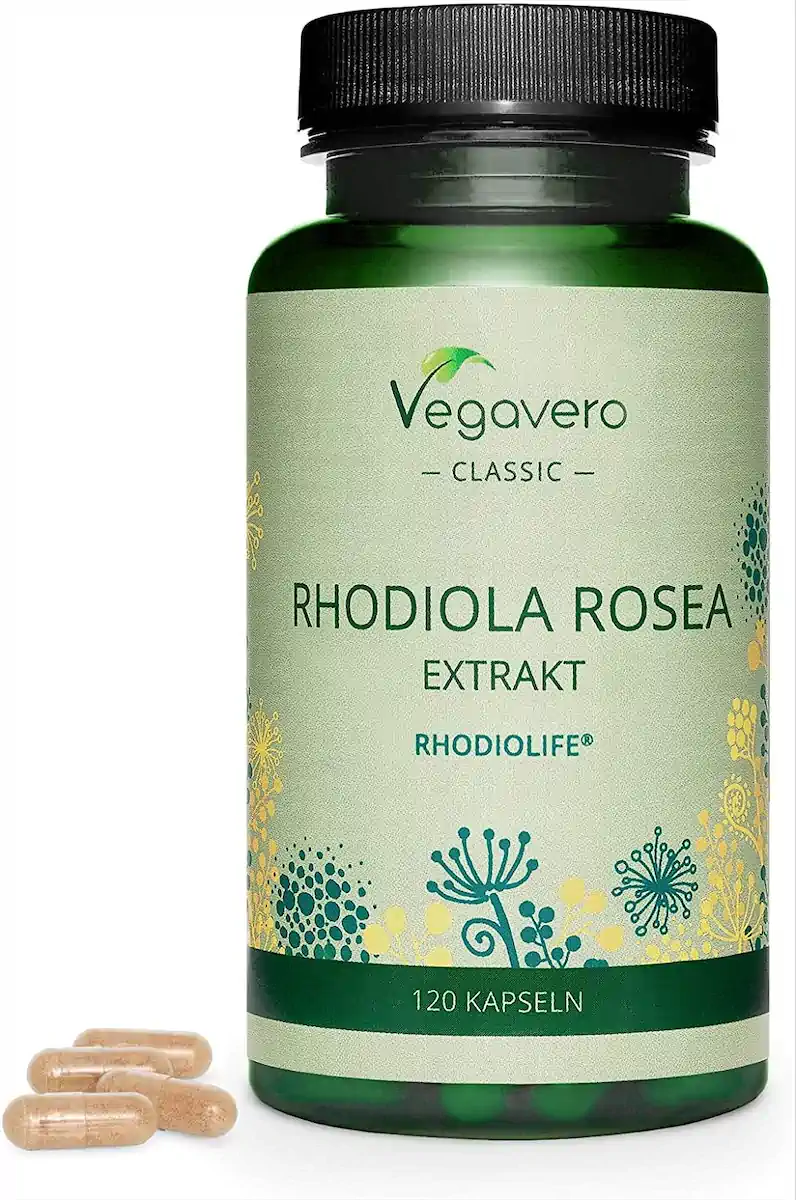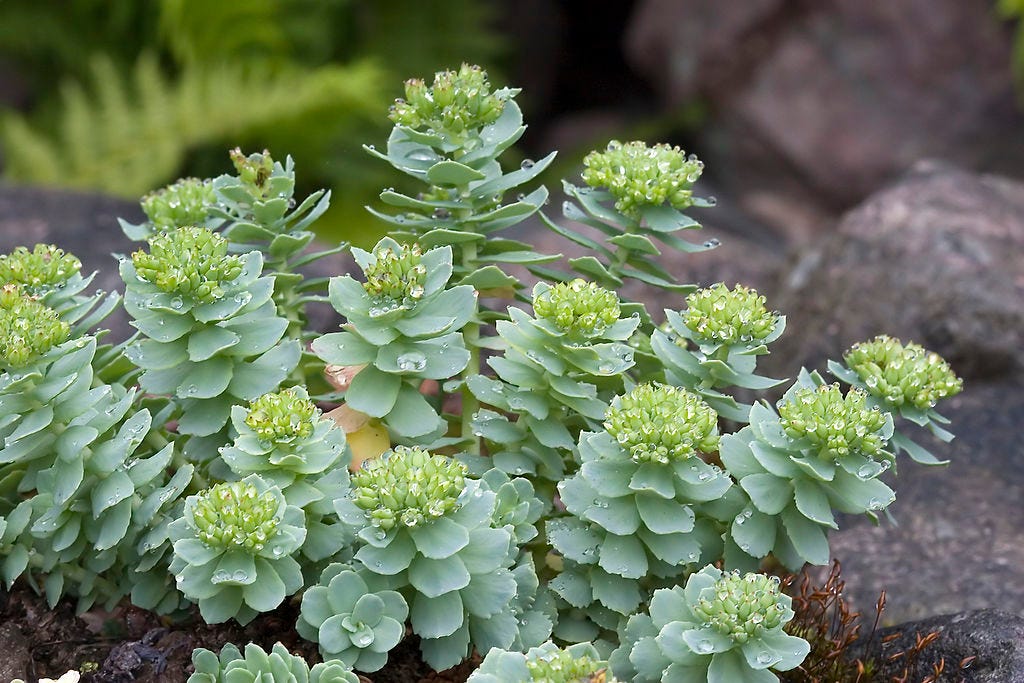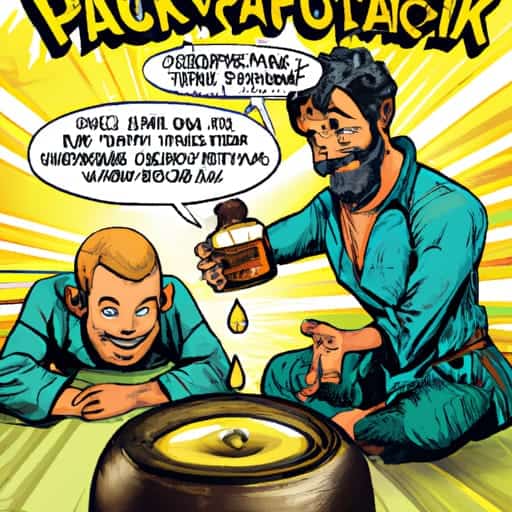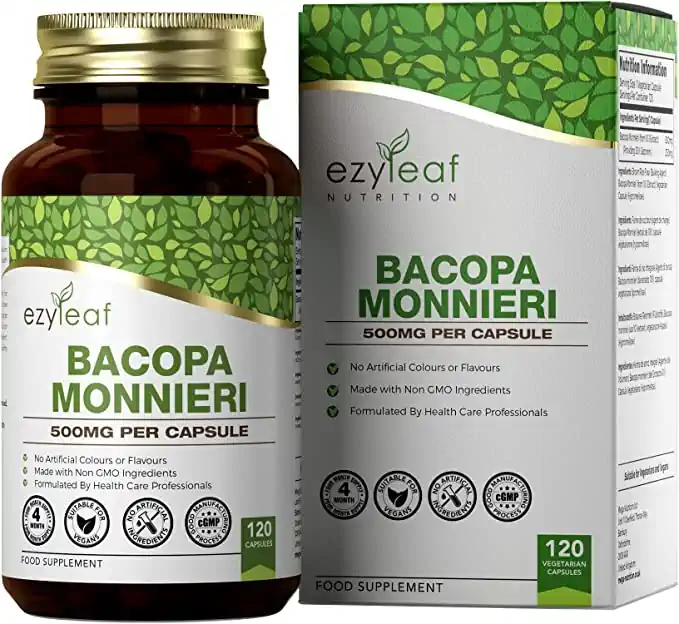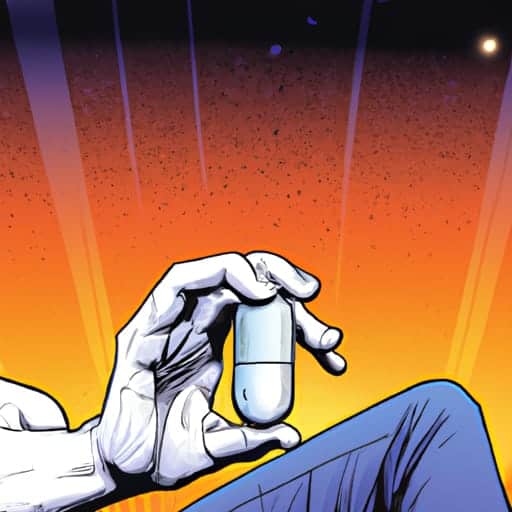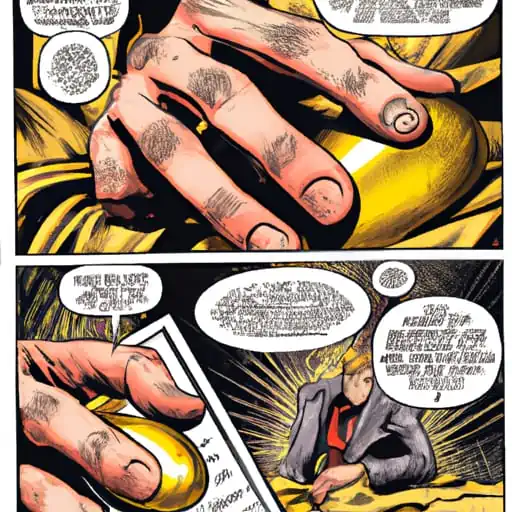Does The Nootropic Rhodiola Increase Energy and Endurance?
Here’s what my Nootropic Rhodiola Self-Experiment Showed Me.
Previously, I experimented with the nootropics L-theanine to help reduce anxiety and bacopa to promote memory. There were mixed results, but on the whole, they did seem to do something.
The next nootropic I tried was Rhodiola. It is claimed that Rhodiola promotes strength, endurance, stamina, and mental capacity, as well as being helpful on your wedding night.
It is also said to give tolerance to cold weather. I wondered whether this was a sympathetic magical idea: because the Rhodiola grows in the Arctic and withstands cold, if you take it, you will withstand cold better too.
But hey, the claims sounded good. I gave it a go. I took 500mg of Rhodiola Rosea each morning around 09:00 for a week and recorded how I felt, as well as some basic physical observations of blood pressure, heart rate, sleep and so on.
Rhodiola Background
Rhodiola Rosea, also known as Aaron’s Rod, The Golden Root, Roseroot or King’s Crown, grows in the arctic regions from Siberia right round to Siberia again, taking in Alaska, Canada, Norway and Russia.
It is first mentioned as a medicine by the Ancient Greek doctor Pedanius Dioscorides in his book De Materia Medica which was published sometime between 50 and 70 of the Common Era. He rates it highly for many things.
It is claimed that the Vikings took it to improve their battle-readiness and that Chinese Emperors sent expeditions to the far north searching for it. When they got it, they brewed it as tea and drank it down.
Indigenous people in Siberia give Rhodiola to newlyweds to boost fertility.
In 1725, the Swedish Botanist Carl Linnaeus prescribed Rhodiola to cure headaches, hernias, and hysteria.
Maybe it’s suitable for all conditions beginning with an ‘h’? Herpes? Hay fever? Heartbreak?
In any case, Rhodiola’s claims have been taken seriously.
Soviet scientists experimented with Rhodiola to improve the performance of their athletes. The cynical among us might suspect this was because they had been caught doping them with steroids and wanted something that wouldn’t show up on the doping tests.
The Soviet military was also interested in Rhodiola because of the claims that it helped with endurance.
Over the last ten years, knowledge about Rhodiola among the supplement taking public has increased. One problem with this increased popularity of the nootropic Rhodiola is that foragers in Canada and Alaska have picked much of the natural Rhodiola in their regions!
The compounds in it, particularly Rosavin, are widely synthesised now by chemists, which reduces the impact on the natural population of the plant.
Rhodiola: The Scientific Research
It should be said that there is no accepted scientific research to back the claims that Rhodiola enhances endurance or any other effect. The American Food and Drug Administration has warned vendors against making claims that Rhodiola actually does anything much.
Despite the lack of recognition by the Powers That Be for the benefits of our nootropic Rhodiola, there have been several studies that plausibly suggest that it has a genuine, beneficial effect on those who take it.
In 2004, Professor Patricia Gerbarg worked in the psychiatry department of the New York Medical College, and she is credited as saying that Rhodiola.
“It stimulates you, without making you crash and burn.”
Optygen is a popular supplement for people competing in cycling and running, and guess what? It contains Rhodiola extract.
A Swedish study from 2009 found that Rhodiola did indeed appear to ease symptoms of fatigue.
https://pdfs.semanticscholar.org/ca71/423d0c1c0968bc9a31b107d0f747dbb9d3f7.pdf
There was an Italian study from 2010 with a study group of only 14, but it showed benefits from Rhodiola in the form of increased exercise tolerance and decreased muscle damage.
A 2013 Study from the Journal of Strength and Conditioning noted that cyclists finished faster and had lower heart rates after taking Rhodiola.
This study claims that Rhodiola reduced the levels of the stress hormone cortisol.
https://onlinelibrary.wiley.com/doi/abs/10.1002/ptr.2013
So despite what the FDA says about there not being any credible evidence for the benefits of this specific nootropic Rhodiola, I beg to differ.
Rhodiola Chemistry
Rhodiola Rosea contains a wide range of chemical compounds. The actual active ingredients of the Rhodolia that create the desired effect have not been identified with 100% certainty, though they appear to be rosavin, rosarin and salidroside, which are polyphenols.
Polyphenols are often thought beneficial for health and are found in reasonable amounts in tea, coffee, red wine, grapes, apples and pears.
The rosavin, rosarin and saldroside are particular to Rhodiola. The supplements generally marketed contain mostly rosavin. As noted above, it can now be synthesised chemically, so check whether your nootropic pill has real or synthesised Rhodiola in it, if you care. Personally, I don’t care. I know there is a lot of debate about taking naturally extracted rather than chemically synthesised supplements and vitamins, but for me, if they are chemically identical, I can’t see there will be much difference in effect.
Of course, others argue you need to take an extract in its natural matrix, so mixed with the rest of the plant. I hear that argument, but so far I’m not convinced.
In any case, the probable nootropic active ingredient rosavin is claimed to have has antidepressant and anti-anxiety effects.
Rosavin is categorised as an ‘adaptogen’ which are chemicals which enhance the body’s ability to respond to stressors such as cold, or fatigue.
Rhodiola works as an antioxidant too and scavenges free radicals which float around the body, causing harm to tissues.
I can’t see any clear pharmacological reasoning why Rhodiola may affect the mental state. With other nootropics, they clearly are chemically close to known psychoactive substances such as glutamate or amphetamine, but I didn’t see that for Rhodiola.
Quantitative Data
I included the weather as that has an influence on my mood. Other factors such as hours asleep, heart-rate and blood pressure are more objective types of measurement.
Week Taking Rhodiola
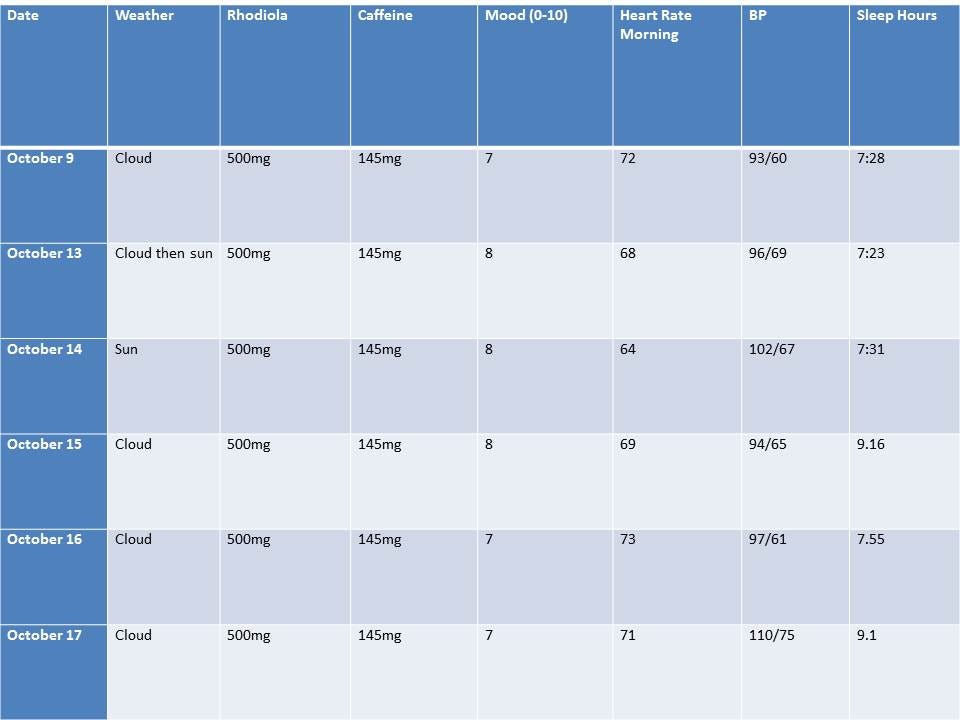
Week Without Nootropics
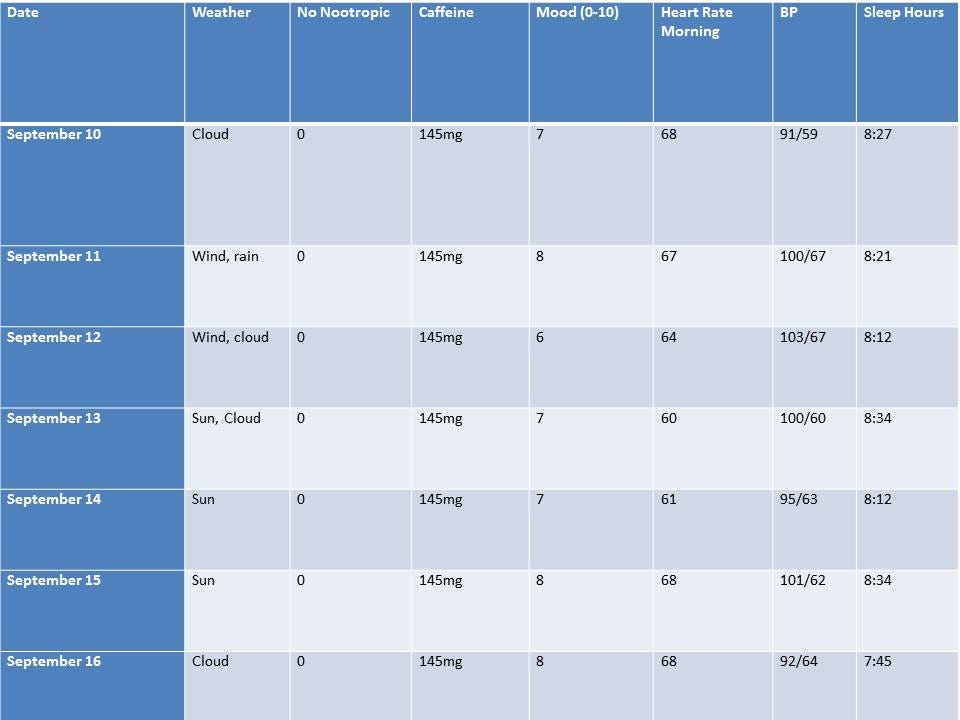
It’s hard to draw reliable conclusions from this, but it seems that my blood pressure was down on Rhodiola, marginally, but my resting heart rate was up. Mood does not appear to differ significantly, though my sleep appears more erratic. It should be said that there are other confounders for this data, such as alcohol, which I had on Friday night in the control week, but not in the Rhodiola week, and an argument with my wife because she said I was argumentative on the Rhodiola! That was 9 October 2020. I remember it well.
Qualitative Results
I took my first dose of 500mg Rhodiola at 09:40 on Friday 9 October. I was not at work and was driving across the country.
My wife told me she noticed I was quite aggressive and argumentative when driving, and I appeared ‘hyper.’
I felt excited, not anxious, but a bit speeded up. I felt I was in a good mood, but I was talking more quickly. This period lasted from around 11:00 until 14:00, and then I felt a crash, a bit like a caffeine come-down.
Because we were away, she asked me not to take any more because of the mood it put me in.
I took my next dose Tuesday 13th October at 09:45. In my journal, I wrote:
“Took Rhodiola an hour ago. Feel anxious now. Disquieted. Jitters.”
“Mild facial flush at 11:45”.
At one point, I used to take niacin, and the Rhodolia flush was nowhere near as strong as that. It made my skin slightly itchy. Flush like this might suggest the liver was struggling to process the supplement. Niacin certainly has liver-damaging properties when taken in high doses.
That evening I wrote:
“Tremendous pang of loss of my past, the kids and my cat.”
Wednesday 15 October:
“About 14:00 felt serene but had been on my bike. Mild itch.”
Thursday 16 October:
“11:00 pressure of speech, jitters, trembly, but mild.”
“13:16 euphoric. Not been on the bike.”
Friday 17 October:
Took Rhodiola but no comments
Saturday 17 October:
Took Rhodiola and felt jittery at 10 am.
“Felt anxious”.
Conclusion About The Nootropic Rhodiola
Rhodiola for me seemed to work as a stimulant, which is in line with claims made for it to increase stamina and endurance. Subjectively, it had a stimulant effect similar to caffeine, or a weaker form of amphetamine.
Adderall is an amphetamine used in nootropics circles, but it seems that Rhodiola has a similar, if milder effect.
My partner observed that I was more talkative and more argumentative and finding fault in other peoples’ behaviour.
I felt energised and hyper but at times this stimulant effect was perceived by me as anxiety or ‘jitters’ and may be caused by the Rhodiola stimulating adrenalin secretion.
Ultimately, I did not enjoy the jittery hyper feeling and I don’t think I’ll be taking Rhodiola again. I would take other nootropics like L-theanine and definitely bacopa, but not Rhodiola.
Next week, Ashwagandha.
I write about health, supplements, nootropics and mental health, and also about the mind, meditation and the paranormal. Why not follow me to find out what I’m up to?

